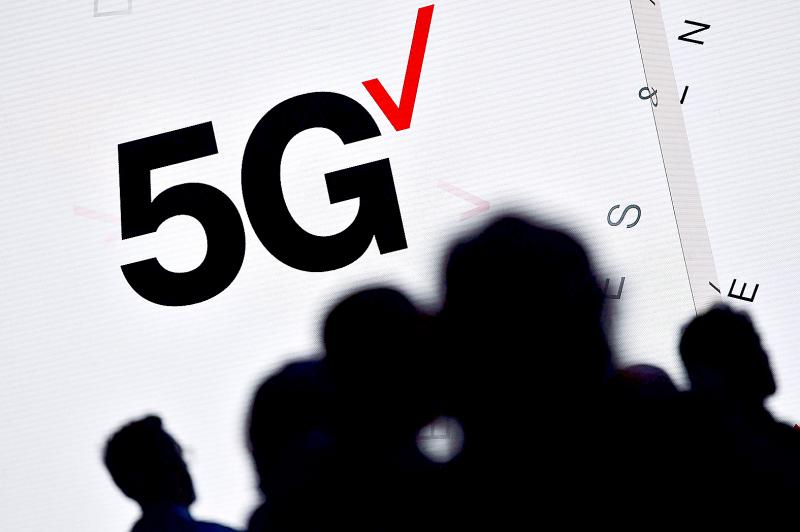Taiwan Mobile Co (台灣大哥大) has accumulated more than 800,000 5G subscribers in the first year of its 5G launch, representing a penetration rate of 14 percent, the company said yesterday.
Subscriptions to its 5G services increased faster than it had expected, the company said, pushing up its penetration rate higher than local peers’, even though it had acquired less of the 5G spectrum than major rivals.
Taiwan Mobile attributed the rapid growth to longer service contracts, its news release said, adding that it lengthened 5G contracts to 48 months, compared with 36 months for 4G service contracts, to ease the financial burden of people opting to sign up for a contract with a flagship smartphone.

Photo: Pau Barrena, AFP
More than half of Taiwan Mobile’s iPhone users selected the 48-month service contracts, and about 80 percent of its overall 5G users subscribed to contracts with high monthly tariffs, starting from NT$999, it said.
Company president Jamie Lin (林之晨) told investors last month that the company’s 5G penetration rate would grow by 1 to 1.5 percent each month this year, implying that the rate would rise to at least 20 percent by the end of this year.
In the first quarter of this year, 5G users helped lift the company’s overall average revenue per user by 26 percent, it said last month.
The company has built more than 6,000 high-speed 3.5 gigahertz 5G base stations covering more than 70 percent of the mobile traffic, it said.
Far EasTone Telecommunications Co (遠傳電信) yesterday said that its 5G subscribers are expected to number 800,000 by next month.
It has deployed more than 7,000 5G base stations since its 5G service launch a year ago.
Chunghwa Telecom Co (中華電信), which also launched 5G services last year, had said that its 5G subscribers would number more than 1 million by the end of this month, thanks to users upgrading faster than expected from 4G services.

CHIP RACE: Three years of overbroad export controls drove foreign competitors to pursue their own AI chips, and ‘cost US taxpayers billions of dollars,’ Nvidia said China has figured out the US strategy for allowing it to buy Nvidia Corp’s H200s and is rejecting the artificial intelligence (AI) chip in favor of domestically developed semiconductors, White House AI adviser David Sacks said, citing news reports. US President Donald Trump on Monday said that he would allow shipments of Nvidia’s H200 chips to China, part of an administration effort backed by Sacks to challenge Chinese tech champions such as Huawei Technologies Co (華為) by bringing US competition to their home market. On Friday, Sacks signaled that he was uncertain about whether that approach would work. “They’re rejecting our chips,” Sacks

NATIONAL SECURITY: Intel’s testing of ACM tools despite US government control ‘highlights egregious gaps in US technology protection policies,’ a former official said Chipmaker Intel Corp has tested chipmaking tools this year from a toolmaker with deep roots in China and two overseas units that were targeted by US sanctions, according to two sources with direct knowledge of the matter. Intel, which fended off calls for its CEO’s resignation from US President Donald Trump in August over his alleged ties to China, got the tools from ACM Research Inc, a Fremont, California-based producer of chipmaking equipment. Two of ACM’s units, based in Shanghai and South Korea, were among a number of firms barred last year from receiving US technology over claims they have

BARRIERS: Gudeng’s chairman said it was unlikely that the US could replicate Taiwan’s science parks in Arizona, given its strict immigration policies and cultural differences Gudeng Precision Industrial Co (家登), which supplies wafer pods to the world’s major semiconductor firms, yesterday said it is in no rush to set up production in the US due to high costs. The company supplies its customers through a warehouse in Arizona jointly operated by TSS Holdings Ltd (德鑫控股), a joint holding of Gudeng and 17 Taiwanese firms in the semiconductor supply chain, including specialty plastic compounds producer Nytex Composites Co (耐特) and automated material handling system supplier Symtek Automation Asia Co (迅得). While the company has long been exploring the feasibility of setting up production in the US to address

OPTION: Uber said it could provide higher pay for batch trips, if incentives for batching is not removed entirely, as the latter would force it to pass on the costs to consumers Uber Technologies Inc yesterday warned that proposed restrictions on batching orders and minimum wages could prompt a NT$20 delivery fee increase in Taiwan, as lower efficiency would drive up costs. Uber CEO Dara Khosrowshahi made the remarks yesterday during his visit to Taiwan. He is on a multileg trip to the region, which includes stops in South Korea and Japan. His visit coincided the release last month of the Ministry of Labor’s draft bill on the delivery sector, which aims to safeguard delivery workers’ rights and improve their welfare. The ministry set the minimum pay for local food delivery drivers at